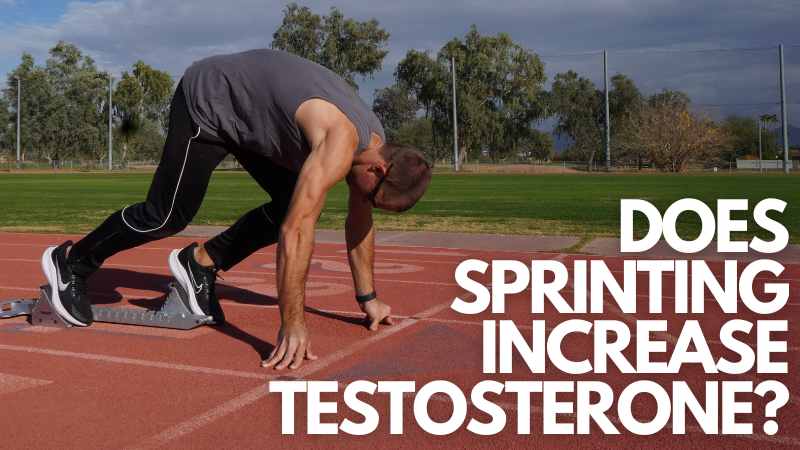Does Sprinting Increase Testosterone?
Testosterone is the main male hormone, which assists in developing muscle mass, strength, and endurance. As such, athletes are always looking for ways to increase their testosterone levels to enhance their performance.
Testosterone is a vital hormone for human health, vitality, and strength, and it is important to optimize testosterone levels with proper diet, exercise, and lifestyle habits. Here we will discuss the effects of sprinting on testosterone levels.
What This Article Will Cover:
- Can Sprinting Increase Testosterone?
- Research On Sprinting & Testosterone
- Frequently Asked Questions
Can Sprinting Increase Testosterone?
According to scientific evidence, sprinting can increase testosterone levels, one of the major benefits of sprinting.
There are reasons why sprinters are so muscular, one of which is their high testosterone.
Research Behind Sprinting's Effect On Testosterone Levels
Research from the University of Cumbria investigated how exercise affects steroid hormone levels in young and middle-aged men.
Study participants were exposed to sprint training and strength training and were assessed for the effects of sprinting on testosterone levels.

Researchers found that Total Testosterone levels increased significantly in groups who completed combined sprint and resistance training.
This research supports the claim that is sprinting increases testosterone.
Similar Frequently Asked Questions
What Exercise Increases Testosterone Most?
High-intensity exercises such as sprinting and weightlifting are good choices to increase testosterone levels. However, resistance training may be the most effective exercise for boosting testosterone levels.
In a study from the Journal of Strength and Conditioning Research, men who performed a resistance training workout with eight different exercises experienced a significant boost in testosterone compared to those who did not exercise.
On the other hand, endurance training, such as long-distance running, may be less effective at increasing testosterone levels. While runners may have higher testosterone levels than sedentary individuals, they typically have lower testosterone levels than weightlifters and other athletes who engage in high-intensity exercise.
Does Sprinting Increase Growth Hormone?
While sprinting has been shown to increase testosterone levels, it may also affect growth hormone levels. Growth hormone is a hormone that stimulates growth, cell reproduction, and regeneration.
The European Journal of Applied Physiology investigated the outcomes of young men who performed 30-second sprints on growth hormone levels.
Researchers found that, as a result of performing maximal effort sprints, human growth hormone levels were increased, staying as high as ten times the basal level one hour after the workout.
Incorporating intense exercise like sprinting into your program can help you maintain healthy growth hormone production.
Which Athlete Has the Highest Testosterone?
Testosterone levels can vary greatly depending on various factors, including age, sex, and exercise habits. Because of this, it is not possible to definitively say which athlete has the highest testosterone.
Regardless, athletes and individuals who want to maximize their natural testosterone levels should perform high-intensity exercises like sprinting and strength training. Likely, weightlifters, sprinters, throwers in track & field, and powerlifters would have high testosterone levels.

Athletes in endurance events will typically have lower testosterone than athletes in the sports mentioned above.
How can you naturally increase testosterone?
Use the following best practices to optimize testosterone levels naturally:
- Exercise regularly: Incorporate high-intensity exercise such as sprinting or strength training to stimulate testosterone production. Resistance training is particularly effective at increasing testosterone levels, so pump some iron!
- Maintain a healthy weight: Obesity and the associated metabolic issues can lower testosterone levels. You will stay healthy and have good testosterone production by eating a proper diet and exercising regularly.
- Get enough sleep: Lack of sleep can lower testosterone levels, so get at least 7-8 hours of sleep each night if you want to keep your testosterone levels high.
- Reduce stress: Chronic stress can lower testosterone levels, which is one why extreme endurance athletes have lower testosterone levels. Utilize meditation, yoga, or deep breathing exercises to reduce stress levels and promote balance in the body.
- Consume a healthy diet: Eating a balanced diet that includes healthy fats, protein, and a variety of fruits and vegetables can help promote healthy testosterone levels.
- Supplement with vitamins and minerals: Certain vitamins and minerals, such as vitamin D and zinc, have been shown to boost testosterone levels. There are also natural testosterone-boosting supplements that are effective at increasing testosterone levels.
- Avoid alcohol and smoking: Excessive alcohol consumption and smoking can lower testosterone levels, so avoiding or limiting these habits is best.
References:
- Loebel, Chad C.; Kraemer, William J.. Testosterone and Resistance Exercise in Men. Journal of Strength and Conditioning Research 12(1):p 57-63, February 1998.
- Sellami, M., Dhahbi, W., Hayes, L. D., Kuvacic, G., Milic, M., & Padulo, J. (2018). The effect of acute and chronic exercise on steroid hormone fluctuations in young and middle-aged men. Steroids, 132, 18–24. https://doi.org/10.1016/j.steroids.2018.01.011
- Nevill, M. E., Holmyard, D. J., Hall, G. M., Allsop, P., van Oosterhout, A., Burrin, J. M., & Nevill, A. M. (1996). Growth hormone responses to treadmill sprinting in sprint- and endurance-trained athletes. European journal of applied physiology and occupational physiology, 72(5-6), 460–467. https://doi.org/10.1007/BF00242276
